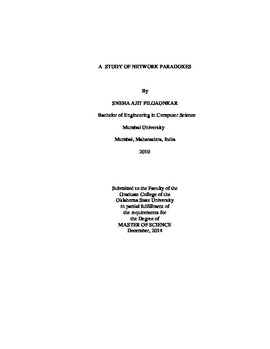| dc.contributor.advisor | Kak, Subhash C. | |
| dc.contributor.author | Pilgaonkar, Sneha Ajit | |
| dc.date.accessioned | 2016-01-20T15:44:50Z | |
| dc.date.available | 2016-01-20T15:44:50Z | |
| dc.date.issued | 2014-12-01 | |
| dc.identifier.uri | https://hdl.handle.net/11244/25702 | |
| dc.description.abstract | Social networks are characterized by their user-oriented nature, and interactive, community-driven and emotion based content. There are some known paradoxes about social network of which `friendship paradox' is the most famous one. According to this paradox, on an average your friends have more friends than you have. This paradox can have either of the two types of origin: statistical or behavioral. A statistical origin can be determined based on the mathematical properties of social connectivity such as mean and median. The research analyzes this problem by using data from one of the online social networks We first show that the social connectivity data does not satisfy Benford's law. This fact and other statistical analysis performed by us establish that the friendship paradox data from social networks has a large behavioral component. | |
| dc.format | application/pdf | |
| dc.language | en_US | |
| dc.publisher | Oklahoma State University | |
| dc.rights | Copyright is held by the author who has granted the Oklahoma State University Library the non-exclusive right to share this material in its institutional repository. Contact Digital Library Services at lib-dls@okstate.edu or 405-744-9161 for the permission policy on the use, reproduction or distribution of this material. | |
| dc.title | Study of Network Paradoxes | |
| dc.type | text | |
| dc.contributor.committeeMember | Cline, David | |
| dc.contributor.committeeMember | Crick, Christopher | |
| osu.filename | Pilgaonkar_okstate_0664M_13804.pdf | |
| osu.accesstype | Open Access | |
| dc.description.department | Computer Science | |
| dc.type.genre | Thesis | |
